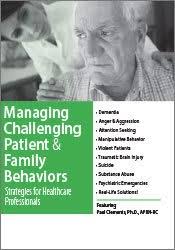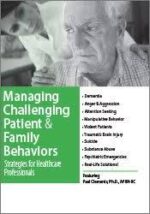Available for Pre-Order. This product will be available within a few days.
 Paul Thomas Clements – Managing Challenging Patient & Family Behaviors
Outline:
Difficult Patient Encounters: Asking the Right Questions
Interviewing the Patient
Types of Intervention
Self-Awareness
What Type of Communicator are You?
Reciprocal Communication
Strategies to Deal with the Angry Patient
Interpersonal Effectiveness & Exploring the Reasonable, Emotional, and Wise Minds
Motivational Interviewing
Understand the Patient’s Motivation
Listen with Empathy
Integration and Application
Empower Through Hope for Change
Communication Styles
The Family
Family Dynamics
Family Communication
Mediation
Psychiatric Emergencies
Schizophrenia, Schizoaffective Disorder
Substance-Induced Psychosis
Major Depression, Bipolar Disorder
Anxiety Disorder
Obsessive-Compulsive Disorder
Antisocial Personality Disorder
Narcissistic Personality Disorder
Histrionic Personality Disorder
Borderline Personality Disorder
Substance Misuse
Prevalence
Evaluation
Psychosocial Intervention
Other Medical Conditions
Geriatric Patients
Dementia
Delirium
Acute Psychosocial Crisis
Sexual Assault
Domestic Violence
Suicide
High-Risk Populations
Suicide & Psychiatric Diagnosis
Violent Patients
Prevalence & Risk
Major Profiles of Violence
Taking Care of Yourself
Would you like to receive  Paul Thomas Clements – Managing Challenging Patient & Family Behaviors ?
Description:
In this interactive seminar, expert and international speaker, Paul Thomas Clements, PhD, APRN-BC, will teach you tips and tools that you can use immediately when faced with challenging patient and family behaviors. This program includes numerous practical strategies that you can implement with difficult situations like aggression, dementia and attention-seeking behaviors while maintaining patient and staff safety. The recording will be filled with opportunities to apply many of these strategies to real patient situations, case studies and interactive discussions. Don’t miss this chance to learn techniques you can implement successfully with your most difficult patients.








